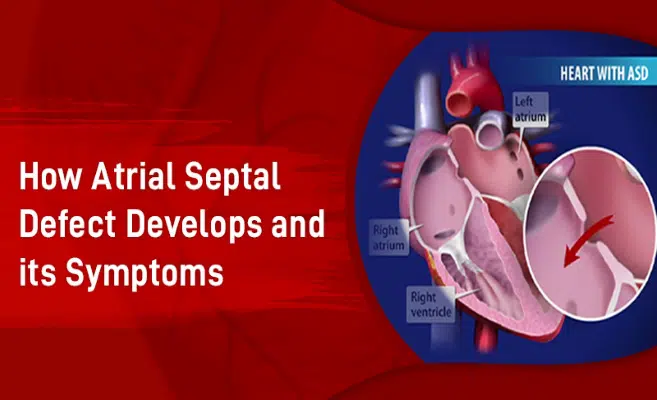How Atrial Septal Defect Develops and its Symptoms

The heart is undoubtedly one of the most valued and loved organ of our body and ironically it symbolizes the very same. It is the very reason for our existence as it performs the most important function in our system. Any dysfunctionality or hindrance in the functioning of the heart is a reason of major worry. Atrial Septal Disease is one such defect that is grieving and elaborate. It is a birth defect and is denoted by a hole in the wall of the heart.
How Atrial Septal Defect Develops?
There is no clear cut reason as to why ASD develops, they are generally by chance due to abnormalities or hurdles in the development of the heart. A child is born with an opening in the two upper chambers of the heart, to allow blood to detour away from the lungs before birth. Once the child is born, the opening closes automatically with time.
When this opening is larger than usual and doesn’t close automatically, it causes ASD with possibilities of other diseases.
Why is it harmful?
This defect causes the oxygenated blood to flow to the right chamber of the heart, this leads to a mixing of the oxygenated blood with the deoxygenated one. The fluxed blood then travels to the lungs. When this hole is large, the excess volume of the blood overfills the lung causing pulmonary hypertension and also results in overworking and burdening of the right of the heart. This burdening becomes the cause of the weakening of the heart’s right side. This condition is fatal and serious.
The various types of ASD are;
1. Secundum: The hole is in the middle of the wall between the atria
2. Primum: The defect is in the lower part of the atrial septum
3. Sinus Venosus: A Very rare AS defect, this occurs in the upper part of the atrial septum.
4. Coronary Sinus: The most serious type of ASD, in this condition the part of the wall between the coronary sinus and the left atrium is missing.
What are its Symptoms?
Generally, children with a small hole in their heart do not show any signs of symptoms however, symptoms start to crop up with either age or when the hole is large. A person with either or all of these signs may show higher chances of developing ASD:
1. Shortness of breath
2. Heart murmur, a sound that is heard through a stethoscope
3. Heart palpitation
4. Fatigue and Strokes
A person with a heart defect this serious, or children with a genetic ASD have very low chances of having a bright future. However, smaller defects may not pose any threat.
ASD once developed can’t be prevented, however, you can get yourself diagnosed for it before or get it treated at PSRI by our head Cardiologist Dr. T. S. Kler and his team of experts (http://www.psrihospital.com/). If you are planning for pregnancy, schedule a preconception visit with our health care provider at PSRI. Give the blessing of a bright and long future to your child with US!

 Book An Appointment
Book An Appointment Virtual Consultation
Virtual Consultation




